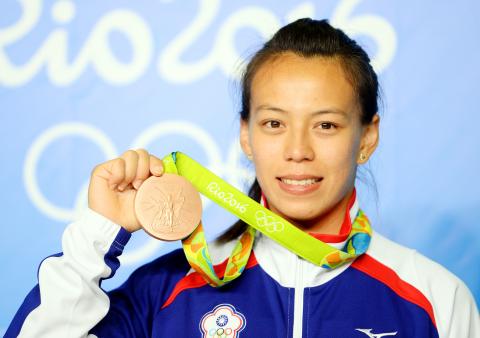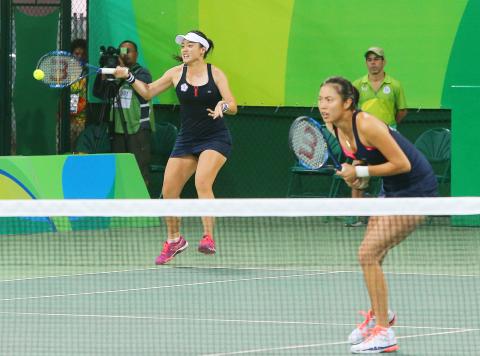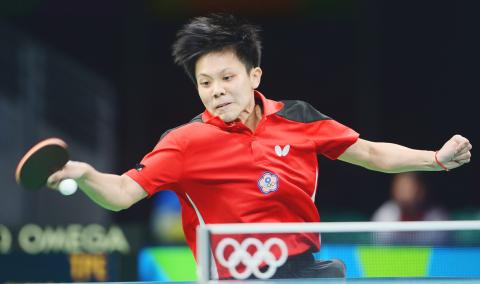Taiwanese women continued their good showing at the Olympic Games in Rio de Janeiro on Monday, with weightlifter Kuo Hsing-chun (郭婞淳) winning the nation’s third medal and three others reaching the quarter-finals at table tennis and tennis events.
Kuo won a bronze medal in the women’s 58kg division, but she said she was disappointed by her performance.
Having won the Asian Weightlifting Championships in late April by lifting a total of 238kg, Kuo was left in tears after lifting a total of 231kg in Rio de Janeiro, attributing her disappointing performance to nerves.

Photo: Lin Cheng-kung, Taipei Times
“Nerves caused my body to be out of sync. It is all on me,” she said, adding that she had trouble with her technique rather than the weight itself. “In the past, the day before a competition, I needed to check my water intake, but this time I controlled everything very well.”
“Being in such good shape and then not having it show in the results” was hard to accept, she said.
“I did not do as well as I wanted,” she added. “I am very disappointed. I hope I can have a better result in the next Olympic Games. This medal does not meet my expectations, but I will keep doing my best and keep trying to attend competitions.”

Photo: CNA
She ranked eighth at the 2012 London Olympics.
Taiwan’s top female table tennis player, Cheng I-ching (鄭怡靜), won two matches on Monday, securing a spot in the women’s table tennis quarter-finals.
Cheng first faced 38-year-old Belarussian Viktoria Pavlovich, whose assortment of slices and effective defensive style initially confused the 24-year-old Taiwanese.

Photo: Lin Cheng-kung, Taipei Times
However, Cheng found the patience to cope with Pavlovich’s approach, only to struggle late in the match before playing her best in the final game to ultimately win the match 7-11, 11-9, 11-7, 11-9, 8-11, 7-11, 11-2.
She then faced South Korean Suh Hyo-won, 29, for a spot in the final eight.
Cheng said Suh was an opponent who had given her trouble in the past, but sped to a 3-0 lead and was seemingly on her way to an easy victory when Suh changed strategies and went on the offensive. Cheng recovered after a timeout and defeated Suh 11-5, 11-9, 11-3, 4-11, 5-11, 9-11, 11-7.
She was scheduled to play Li Xiaoxia (李曉霞) of China in the quarter-finals yesterday.
Li won gold in the women’s singles at the 2012 London Olympics.
On the tennis court, the third-seeded sister pairing of Chan Hao-ching (詹皓晴) and Chan Yung-jan (詹詠然) beat British pair Johanna Konta and Heather Watson 3-6, 6-0, 6-4 to advance to the women’s doubles quarter-finals.
They are to face Martina Hingis and Timea Bacsinszky of Switzerland in the quarter-finals tomorrow.
After three full days of competitions in Rio de Janeiro, Taiwan was one of 20 nations to have won a gold medal and one of 13 nations to have won at least three medals.
Prior to Kuo’s bronze on Monday, Taiwanese athletes won a weightlifting gold medal in the women’s 53kg division and a bronze medal in the women’s team event in archery on Sunday.

DAREDEVIL: Honnold said it had always been a dream of his to climb Taipei 101, while a Netflix producer said the skyscraper was ‘a real icon of this country’ US climber Alex Honnold yesterday took on Taiwan’s tallest building, becoming the first person to scale Taipei 101 without a rope, harness or safety net. Hundreds of spectators gathered at the base of the 101-story skyscraper to watch Honnold, 40, embark on his daredevil feat, which was also broadcast live on Netflix. Dressed in a red T-shirt and yellow custom-made climbing shoes, Honnold swiftly moved up the southeast face of the glass and steel building. At one point, he stepped onto a platform midway up to wave down at fans and onlookers who were taking photos. People watching from inside

A Vietnamese migrant worker yesterday won NT$12 million (US$379,627) on a Lunar New Year scratch card in Kaohsiung as part of Taiwan Lottery Co’s (台灣彩券) “NT$12 Million Grand Fortune” (1200萬大吉利) game. The man was the first top-prize winner of the new game launched on Jan. 6 to mark the Lunar New Year. Three Vietnamese migrant workers visited a Taiwan Lottery shop on Xinyue Street in Kaohsiung’s Gangshan District (崗山), a store representative said. The player bought multiple tickets and, after winning nothing, held the final lottery ticket in one hand and rubbed the store’s statue of the Maitreya Buddha’s belly with the other,

‘COMMITTED TO DETERRENCE’: Washington would stand by its allies, but it can only help as much as countries help themselves, Raymond Greene said The US is committed to deterrence in the first island chain, but it should not bear the burden alone, as “freedom is not free,” American Institute in Taiwan Director Raymond Greene said in a speech at the Institute for National Defense and Security Research’s “Strengthening Resilience: Defense as the Engine of Development” seminar in Taipei yesterday. In the speech, titled “Investing Together and a Secure and Prosperous Future,” Greene highlighted the contributions of US President Donald Trump’s administration to Taiwan’s defense efforts, including the establishment of supply chains for drones and autonomous systems, offers of security assistance and the expansion of

Japan’s strategic alliance with the US would collapse if Tokyo were to turn away from a conflict in Taiwan, Japanese Prime Minister Sanae Takaichi said yesterday, but distanced herself from previous comments that suggested a possible military response in such an event. Takaichi expressed her latest views on a nationally broadcast TV program late on Monday, where an opposition party leader criticized her for igniting tensions with China with the earlier remarks. Ties between Japan and China have sunk to the worst level in years after Takaichi said in November that a hypothetical Chinese attack on Taiwan could bring about a Japanese